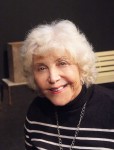The original version of this article contained an error and has been changed. See the bottom of the article for more information.
Personal tragedy led UCLA alumna Carole Eglash-Kosoff out of the United States and to the townships of South Africa.
Eglash-Kosoff, who graduated in 1956 with a bachelor’s degree in business and accounting, lost multiple loved ones in a one-month period eight years ago. Unsure of what to do next, Eglash-Kosoff decided to volunteer through New York’s American Jewish World Service to teach business techniques to South African charities.
In South Africa, Eglash-Kosoff met Helen Lieberman, the founder of Ikamva Labantu, a network of local women working with villages to create community programs geared toward health, learning, development and resources for children and senior citizens.
The next year, Eglash-Kosoff was invited back to hear Lieberman’s story. While there, Eglash-Kosoff visited local villages to meet people who were working with Ikamva Labantu and to help villages affected by apartheid, the system of racial segregation in South Africa during the twentieth century. Eglash-Kosoff’s interviews with these people eventually evolved into a novel chronicling their experiences, “The Human Spirit: Apartheid’s Unheralded Heroes.”
Eglash-Kosoff has since adapted the novel into a production, “The Human Spirit,” which focuses on a Jewish, white middle-class woman’s interaction with various South African characters, based on the real-life interviewees, and her work to oppose apartheid by taking up a role in South African parliament.
“The Human Spirit” will play at the Odyssey Theatre in Los Angeles until Sunday. The Daily Bruin’s Leyla Kumble spoke with Eglash-Kosoff about how she adapted her experiences in South Africa into a theater production.
Daily Bruin: Can you tell me a little about the experience that led to the writing of “The Human Spirit” and your experiences in South Africa?
Carole Eglash-Kosoff: Eight years ago, my husband died. In the same 30-day period, my mother and brother died, and I was trying to figure out what to do with my life. I heard a commercial on National Public Radio from this group in New York looking for volunteers to teach in foreign countries. I applied and ended up going to South Africa. I met this amazing woman (Lieberman), and we agreed that I would come back the following year and write about her and her organization of women, Ikamva Labantu.
DB: What about Lieberman inspired you to return to South Africa after leaving your teaching post?
CEK: She was a woman who had a nice living and lived in a nice area, but she saw things around that her (that) upset her. Things were very unfair, unfair culturally and economically, because she was in a country that was in disarray between the apartheid government and black activists.
DB: When you came back the next year, how did you go about beginning to interview native South Africans?
CEK: They were all working in Ikamva. They were setting up senior centers and preschools. I went to a whole range of cities to put on these seminars (for business management) and also to interview these people. I conducted more than 60 interviews of all the men and women who worked during the apartheid era in the townships.
It was really just hearing their stories and finding out how they had all survived during these years and the problems they had had with the apartheid government. I also researched a lot of material at the University of Cape Town.
DB: How did the people you interviewed help to improve conditions for those areas affected by the apartheid government?
CEK: There was this amazing Jewish woman, named Helen Suzman, (an activist against the apartheid government) who was in Parliament. But outside of that, these people I interviewed were working very clandestinely to bring food and medications and set up some structures in these townships that had absolutely nothing.
DB: What motivated you to transform these interviews centered around apartheid into a book and later a play?
CEK: I went down there to work and to help and got caught up in these people. I was writing essays back to friends, and then I got caught up in not only this (story), but it sent me on a path of writing my next two books about racial injustice … in this country.
DB: When adapting “The Human Spirit” for the stage, what were some of the changes made to the form of the narrative?
CEK: The book has a lot of additional stories and characters. Except for the three or four main characters, some (characters) are composites of the people I worked with. I was trying to evoke a different kind of emotion for my characters.
DB: Since this story is such a personal experience for you, how did you find a director to help you realize your vision?
CEK: Most of those that applied for director had come out of the film industry and had a completely different vision of this. (The director) Donald Squires had come out of the stage in New York … and with him it has become a collaborative process.
DB: What is it like to see your story onstage?
CEK: It’s one thing to see it but another to feel the audience. Some members (of the audience) were crying and that was touching. One woman came up to me and said that I just told her story. Her husband died and her sister was an activist. The reaction of the people is most amazing.
At the end of the play the cast sings the South African national anthem in three languages … people that come from South Africa are crying, openly sobbing, at the end of this play. A lot of other people just didn’t know this part of South African (apartheid) history.
Correction: Eglash-Kosoff studied business and accounting.
